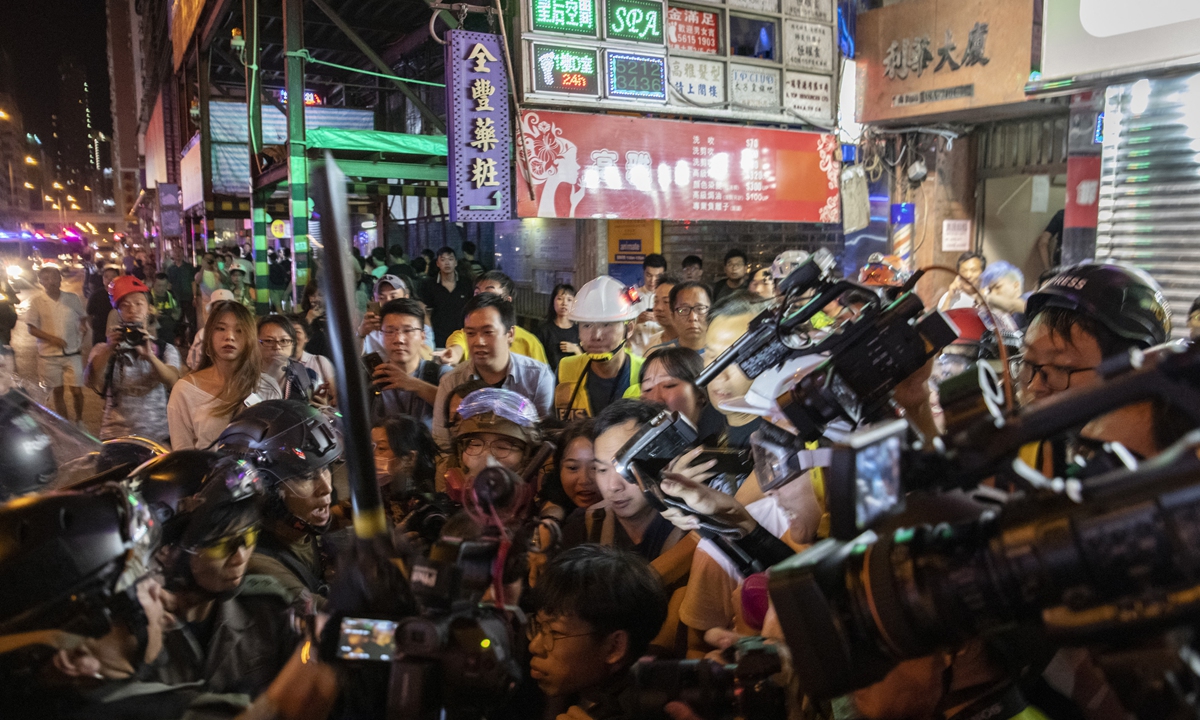
Police officers face a large crowd of what appears to be press as they move to arrest a rioter outside the Prince Edward police station in Hong Kong, on September 22, 2019. Photo: AFP
After the Wall Street Journal (WSJ) fired the new chairperson of the infamous Hong Kong Journalists Association (HKJA), some Hong Kong-based observers told the Global Times that the real reason for the US media's action is the long-standing misconduct of the HKJA. Observers believed that springing from concerns that the Hong Kong Special Administrative Region (HKSAR) government could take legal action to regulate such organizations, the WSJ wants to distance itself to avoid being implicated.
Selina Cheng, who worked in the WSJ's Hong Kong bureau as a reporter, was elected on June 22 as the HKJA's new chairperson, Reuters reported.
Cheng said she was told by her supervisor that employees of the WSJ "should not be seen as advocating for press freedom in a place like Hong Kong given a potential conflict of interest," the media report said.
Prior to her election, Cheng had
written a number of articles attacking the National Security Law (NSL) for Hong Kong and the Safeguarding National Security Ordinance for "suppressing human rights and freedoms."
The HKJA, with its spotty history of colluding with separatist politicians and instigating riots in Hong Kong, is by no means a professional organization representing the Hong Kong media, some observers said. It instead serves as a base for anti-China separatist forces to disrupt Hong Kong, and a malignant tumor that harms the city's safety and stability, experts said.
Senior editors at the WSJ had "directed" Cheng to withdraw her candidacy and resign from the board a day before the vote despite approving her participation when hiring her in 2022, the Standard reported, citing the chairperson.
The WSJ has realized the role of a journalist should convey only facts to the audience in a responsible manner. In fact, personal stance and political bias should be isolated from press-reporting and media. Journalists should focus on their tasks and should not abuse their platforms, according to Chu Kar-kin, a veteran current affairs commentator and deputy secretary-general of the Hong Kong Association for Promotion of Peaceful Reunification of China.
"Employers reserve their rights to lay off or dismiss an employee provided that all legal obligations are complied with," Chu told the Global Times on Thursday.
The real reason for the WSJ's distancing from the new HKJA chairman is the long-standing misconduct of the association, said Willy Fu, a law professor who is also the director of the Chinese Association of Hong Kong & Macao Studies.
"The HKJA prioritizes political stances, openly violates professional journalist ethics, and wantonly defames the central and the HKSAR governments as well as the NSL for Hong Kong, providing support to anti-China and disruptor elements," Fu said, noting that it is not a genuine journalists' association and continues to operate covertly.
Fu believed that the WSJ, considering that the HKSAR government could take legal action to regulate the organization, wants to distance itself to avoid being implicated.
Some observers also pointed out that foreign media are using this case to sensationalize claims that "press freedom in Hong Kong is being improperly interfered with."
"Their aim is to confuse right and wrong, defame the HKSAR government and the Hong Kong police, and create a climate of fear," Fu said.
Less than 20 days after the new executive committee of the HKJA took office, several directors announced their resignation, and now the newly appointed chairperson has been dismissed by the WSJ, said Victor Chan Chi-ho, executive vice chairman of the Hong Kong Association of Young Commentators.
"I believe that the bleak situation faced by the HKJA is largely due to the widespread belief in society that this union severely harms Hong Kong's stability, leading to its current state of widespread alienation," Chan told the Global Times.
"The WSJ's decision to terminate Cheng, in my view, reflects their awareness of the HKJA's malign nature and concerns about the media's credibility being affected by Cheng's role as the HKJA chairperson," Chan said, noting that this decision is a timely measure to mitigate losses and is unrelated to press freedom.




